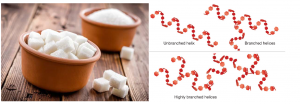People eat sugar every day, but do you know scientists can make whatever types of sugar they want? A group of researchers led by Dr Stephen Withers from the University of Columbia found an efficient method for creating new sugars. They selected a powerful type of biological catalyst called enzymes, which can assemble certain types of sugar molecules faster and cleaner than other chemical catalysts. This method has potential applications in drug development for diseases such as diabetes and obesity.
Sugars are referred to as a type of molecules that consist of units of hydrocarbons assembled in a long chain. The picture below shows various sugar molecules. Each hexagon represents a sugar unit, and different sugars have different numbers of units. Sugars with only one unit are called monosaccharides. Glucose and fructose are common monosaccharides. Our table sugar has one glucose combined with one fructose and is called disaccharide (of course!). Polysaccharides consist of starch, cellulose, and glycogen (sugar stored in your body). Sugars also exist on the cell surface and act as the receptor for many drug molecules. Therefore, knowing the properties of different sugars and how to synthesize them is an essential topic in modern biology and chemistry.

Figure 1. Sugar in daily life vs. Sugar in chemistry
Despite sugars are important to human, making the desired type of sugar molecules is a tricky problem. The reason is that many sugar units have a unique geometry. To maintain the biological functions of sugars, we also need to keep its original shape. Most of the synthetic chemical methods can assemble the sugar unit in the desired order, but cannot retain the geometry. To solve this problem, Withers and his group decided to use a “secret weapon” in biology—enzymes.
Enzymes are a special type of proteins widely existing in all organisms. They can accelerate the chemical reactions in our body and sustain normal metabolic processes. More importantly, enzymes are highly specific to particular sugar geometry. In other words, they only react with sugars that fit their structures and yield product that also has one specific structure. The type of enzymes accelerates sugar assembly is called glycosynthase, and the type accelerates disassembly is called glycoside hydrolase. Now, using enzymes seem to be promising, but where to find the enzymes we want?
To find the desired enzyme more quickly, scientists used a technique called metagenomics which allows them to sample the genes of millions of microorganisms without the need for individual culture. Instead of directly searching for enzymes that can link the sugar together, the first step is to find enzymes (glycoside hydrolase) which break sugar bond (Surprise!). Researchers used bacteria as factories to produce the enzymes and collect them together. Of course, we want enzyme glycosynthase that LINK sugar bonds. The next step is to reconstruct those enzymes such that they can assemble the sugar correctly. Researchers change the reaction centre of the glycoside hydrolase by muting some of the critical structures. By doing so, some of the glycoside hydrolases betrayed their original duties and started to assemble the sugar unit. Figure 2 shows the overall procedures for the experiment.

Figure 2. Experimental procedure. Sugars are shown as chair-like hexagons. The aim is to link the sugars to various substrate molecules (shown in different colours).
Eventually, Withers and his group found eight types of enzymes that are specific to the assembly of different sugar molecules, which is almost impossible using traditional methods. As discussed before, sugars construct the receptors for drug and other signal molecules in our body. Understanding how to synthesize sugar will help scientists build new medicines targeted to specific body cells. Diseases such as diabetes and obesity that are related to sugars will also be better understood in the future.
Reference:
Armstrong, Z.; Liu, F.; Chen, H.-M.; Hallam, S. J.; Withers, S. G. Systematic Screening of Synthetic Gene-Encoded Enzymes for Synthesis of Modified Glycosides. ACS Catalysis 2019, 9 (4), 3219–3227.
https://pubs.acs.org/doi/abs/10.1021/acscatal.8b05179
